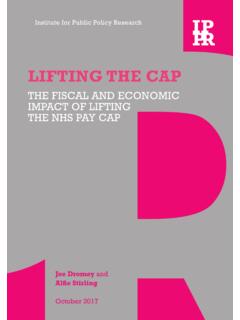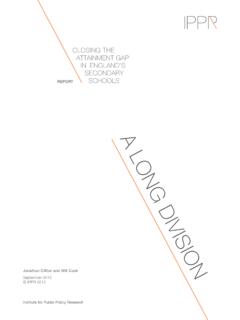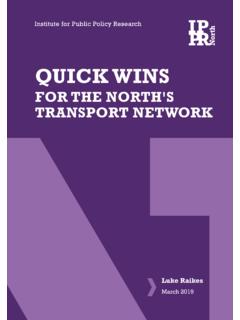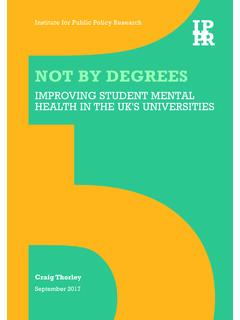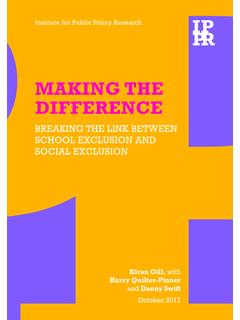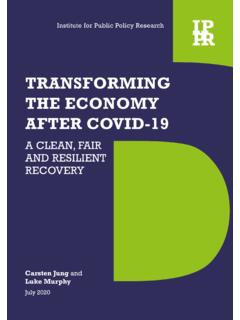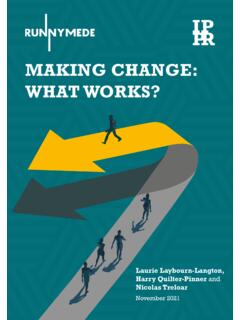Transcription of Finance and the UK’s current account deficit - ippr.org
1 IPPR Commission on economic JusticeOn Borrowed TimeFinance and the UK s current account deficit Grace BlakeleyDiscussion PaperGet in touchFor information or to contact the IPPR Commission on economic Justice, please report was first published in June 2018 IPPR 2018 Dominic Barton Global Managing Partner, McKinsey and CompanySara Bryson Community Organiser, Tyne & Wear Citizens, Citizens UKMatthew Clifford MBE Co-founder and CEO, Entrepreneur FirstCharlie Cornish Group Chief Executive, Manchester Airports Group plc Claire Dove OBE, DL Chief Executive, Blackburne House Group; former Chair of Social Enterprise UKLord John Eatwell President, Queens College, University of Cambridge; Professor Emeritus, Judge Business SchoolGrace Gould Entrepreneur in Residence, LocalGlobeSandra Kerr OBE Race Equality Director, Business in the CommunityLord Bob Kerslake Chair of Peabody, Former Head of the Civil ServiceTom Kibasi Director, Institute for Public policy Research (IPPR) and Chair of the CommissionJohn Mills Founder and Chairman, JMLC atherine McGuinness Chairman, policy and Resources Committee, City of London CorporationMariana Mazzucato Professor in the Economics of Innovation and Public Value, University College London Dame Helena Morrissey DBE Head of Personal Investing, Legal & General Investment Management.
2 Founder of the 30% ClubFrances O'Grady General Secretary, Trades Union CongressStephen Peel Founder and Chairman, SMP policy InnovationMary Senior Scotland Official, University and College UnionHetan Shah Executive Director, Royal Statistical SocietyMustafa Suleyman Co-founder and Head of Applied Artificial Intelligence, DeepMindSally Tallant Director, Liverpool Biennial Festival of Contemporary Art Neera Tanden President, Center for American ProgressThe Most Revd and Rt Hon Justin Welby Archbishop of CanterburyThe IPPR Commission on economic JusticeThe IPPR Commission on economic Justice is a landmark initiative to rethink economic policy for post-Brexit in November 2016, the Commission brings together leading figures from across society from business and trade unions, civil society organisations and academia to examine the challenges facing the UK economy and make practical recommendations for reform.
3 The Commission is undertaking a wide-ranging programme of research and policy consultation on issues including industrial strategy, macroeconomic policy , taxation, work and labour markets, wealth and ownership, sub-national economic policy and technological change. Through a major programme of communications, events and stakeholder engagement it aims to contribute to both public debate and public policy on the economy. Non-partisan, it has been welcomed by both government and opposition Commission s Interim Report, Time for Change: A New Vision for the British Economy, was published in September 2017. Its Final Report will be published in autumn IPPR Commission on economic JusticeABOUT THE AUTHORG race Blakeley is a research fellow at Commission publishes discussion papers to contribute to debate on issues of major importance.
4 These discussion papers should not be taken to represent the collective views of the Commission or the views of individual commissioners, or the organisations with which they are affiliated. They reflect only the views of their named authors. The Commission welcomes responses and reactions to discussion paper was informed and improved by helpful conversations with a number of organisations and individuals, particularly Scott Lavery and his colleagues at SPERI, who hosted an informative roundtable for the project, and Jeremy Green. The author would also like to thank members of the IPPR Commission on economic Justice for their insightful contributions to the work as it developed, particularly Catherine Colebrook, who provided overall guidance for the report. The author would like to thank Richard Maclean and Abi Hynes for editing and publishing the report, and Jade Azim, who came up with the title.
5 THANKSIPPR is extremely grateful to the Friends Provident Charitable Foundation, GMB and TSSA, and a number of individual donors, for their support of the Commission. Their support should not be taken as agreement with the content of this or other Commission document is available to download as a free PDF and in other formats at: you are using this document in your own writing, our preferred citation is: Blakeley G (2018) On Borrowed Time: Finance and the UK's current account deficit , IPPR. to shareThis document is published under a creative commons licence: Attribution-NonCommercial-NoDerivs UK For commercial use, please contact | On Borrowed Time Finance and the UK s current account deficit 1 ContentsSummary ..2 Introduction ..51. The UK has been able to maintain a current account deficit without a falling exchange rate due to large financial inflows from overseas.
6 6 The balance of payments ..6 The role of the exchange rate ..102. The UK s unbalanced international position has been enabled by a combination of global imbalances, asset price inflation, and the financialisation of the UK economy ..13 Global imbalances and asset price inflation ..13 Financialisation ..163. Financialisation of the UK economy has increased asset prices and financial instability, led to Dutch disease and rising inequality, and driven financial market concentration ..19 Financialisation and crisis ..19 Financial Dutch disease ..20 Inequality ..21 Market concentration ..224. Rebalancing the UK s international position requires moderating the significance of Finance within the UK economy and bringing asset price volatility under control, while nurturing non-financial exporting sectors.
7 23 Exchange rate controls ..23 Capital controls ..24 Tackling financialisation head-on ..255. Recommendations ..26 Regulating the financial sector ..26 Rethinking the bank levy ..28 Managing capital flows: A financial transactions tax on currency trading ..29 Taming offshore Finance ..30 Industrial strategy ..31 Conclusion ..33 References ..34 IPPR | On Borrowed Time Finance and the UK s current account deficit 2 SummaryThe UK s longstanding current account deficit indicates that the UK economy has a fundamental problem of international competitiveness. While in the past we have been able to support this through international borrowing, this is not sustainable in the long-term, particularly if Brexit leads to a weakening of the economy and its perceived attractiveness to overseas lenders and investors.
8 This discussion paper sets out four key propositions on the drivers of our current account imbalance, the ways in which it makes our economy vulnerable and hampers overall economic performance, and the actions needed to reduce it. 1. The UK has been able to maintain a current account deficit without a falling exchange rate due to large financial inflows from overseas. Our current account deficit reached a peak of 6 per cent of GDP in 2017 one of the largest of any advanced economy. This was financed by a similar-sized surplus on the UK s financial account , showing the capital flowing into UK assets from the rest of the world. Overseas purchasing of UK assets and lending to UK households and businesses has sustained a much higher exchange rate than would normally be expected given the current account deficit .
9 2. The UK s unbalanced international position has been enabled by a combination of global imbalances, asset price inflation, and the financialisation of the UK economy. Since the late 1990s, national economies have become increasingly polarised between those with current account surpluses, and those which are net borrowers from the rest of the world. The factors that have caused these imbalances have also pushed down global interest rates. The UK s current account has experienced two related effects as a result: consumers have been able to fund more consumption through borrowing, increasing the trade deficit ; and global demand for UK assets has pushed up sterling, reducing our competitiveness. The UK s unusually sophisticated and large financial sector has helped to perpetuate the UK s imbalances: it facilitates a large volume of trading, much of which is speculative, and is an attractive destination for illicit capital flows, both of which increase demand for the currency and therefore push up its value.
10 Regulators have in the past failed to adequately understand and counter the risks that this activity implies for the rest of the These structural imbalances result from the financialisation of the UK economy, which has increased asset prices and financial instability, led to Dutch disease and rising inequality, and driven financial market concentration. Over the last 30 years the financial sector has grown as a proportion of the UK economy. It is now a major contributor to jobs, tax receipts and value-added in the UK economy. But these benefits have come at a cost. Financialisation defined as the increasing role of financial motives, financial markets, financial actors and financial institutions in the economy makes makes the UK prone to financial crises, by increasing the volume of lending to businesses and consumers in the upswing of a financial cycle, and the withdrawal of credit as the bubble bursts, leading to periods of damaging debt deflation, and deeper and longer recessions than might occur otherwise.
